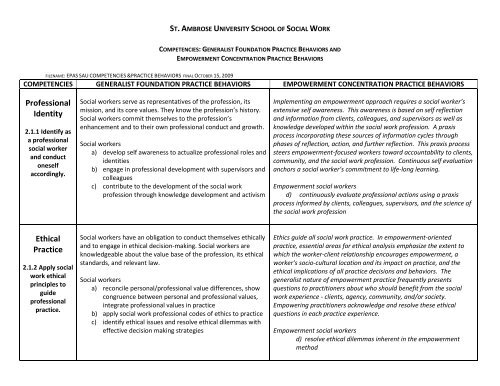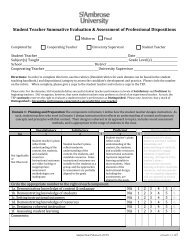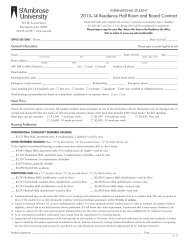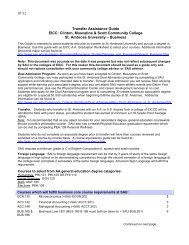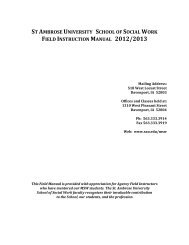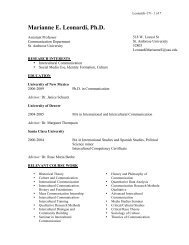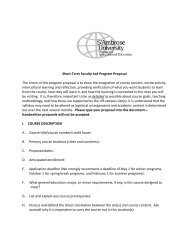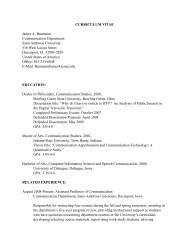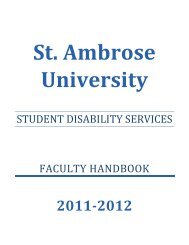Practice Behaviors and Competency Outcomes for School of Social ...
Practice Behaviors and Competency Outcomes for School of Social ...
Practice Behaviors and Competency Outcomes for School of Social ...
You also want an ePaper? Increase the reach of your titles
YUMPU automatically turns print PDFs into web optimized ePapers that Google loves.
ST. AMBROSE UNIVERSITY SCHOOL OF SOCIAL WORK<br />
COMPETENCIES: GENERALIST FOUNDATION PRACTICE BEHAVIORS AND<br />
EMPOWERMENT CONCENTRATION PRACTICE BEHAVIORS<br />
FILENAME: EPAS SAU COMPETENCIES &PRACTICE BEHAVIORS FINAL OCTOBER 15, 2009<br />
COMPETENCIES GENERALIST FOUNDATION PRACTICE BEHAVIORS EMPOWERMENT CONCENTRATION PRACTICE BEHAVIORS<br />
Pr<strong>of</strong>essional<br />
Identity<br />
2.1.1 Identify as<br />
a pr<strong>of</strong>essional<br />
social worker<br />
<strong>and</strong> conduct<br />
oneself<br />
accordingly.<br />
<strong>Social</strong> workers serve as representatives <strong>of</strong> the pr<strong>of</strong>ession, its<br />
mission, <strong>and</strong> its core values. They know the pr<strong>of</strong>ession’s history.<br />
<strong>Social</strong> workers commit themselves to the pr<strong>of</strong>ession’s<br />
enhancement <strong>and</strong> to their own pr<strong>of</strong>essional conduct <strong>and</strong> growth.<br />
<strong>Social</strong> workers<br />
a) develop self awareness to actualize pr<strong>of</strong>essional roles <strong>and</strong><br />
identities<br />
b) engage in pr<strong>of</strong>essional development with supervisors <strong>and</strong><br />
colleagues<br />
c) contribute to the development <strong>of</strong> the social work<br />
pr<strong>of</strong>ession through knowledge development <strong>and</strong> activism<br />
Implementing an empowerment approach requires a social worker’s<br />
extensive self awareness. This awareness is based on self reflection<br />
<strong>and</strong> in<strong>for</strong>mation from clients, colleagues, <strong>and</strong> supervisors as well as<br />
knowledge developed within the social work pr<strong>of</strong>ession. A praxis<br />
process incorporating these sources <strong>of</strong> in<strong>for</strong>mation cycles through<br />
phases <strong>of</strong> reflection, action, <strong>and</strong> further reflection. This praxis process<br />
steers empowerment-focused workers toward accountability to clients,<br />
community, <strong>and</strong> the social work pr<strong>of</strong>ession. Continuous self evaluation<br />
anchors a social worker’s commitment to life-long learning.<br />
Empowerment social workers<br />
d) continuously evaluate pr<strong>of</strong>essional actions using a praxis<br />
process in<strong>for</strong>med by clients, colleagues, supervisors, <strong>and</strong> the science <strong>of</strong><br />
the social work pr<strong>of</strong>ession<br />
Ethical<br />
<strong>Practice</strong><br />
2.1.2 Apply social<br />
work ethical<br />
principles to<br />
guide<br />
pr<strong>of</strong>essional<br />
practice.<br />
<strong>Social</strong> workers have an obligation to conduct themselves ethically<br />
<strong>and</strong> to engage in ethical decision-making. <strong>Social</strong> workers are<br />
knowledgeable about the value base <strong>of</strong> the pr<strong>of</strong>ession, its ethical<br />
st<strong>and</strong>ards, <strong>and</strong> relevant law.<br />
<strong>Social</strong> workers<br />
a) reconcile personal/pr<strong>of</strong>essional value differences, show<br />
congruence between personal <strong>and</strong> pr<strong>of</strong>essional values,<br />
integrate pr<strong>of</strong>essional values in practice<br />
b) apply social work pr<strong>of</strong>essional codes <strong>of</strong> ethics to practice<br />
c) identify ethical issues <strong>and</strong> resolve ethical dilemmas with<br />
effective decision making strategies<br />
Ethics guide all social work practice. In empowerment-oriented<br />
practice, essential areas <strong>for</strong> ethical analysis emphasize the extent to<br />
which the worker-client relationship encourages empowerment, a<br />
worker’s socio-cultural location <strong>and</strong> its impact on practice, <strong>and</strong> the<br />
ethical implications <strong>of</strong> all practice decisions <strong>and</strong> behaviors. The<br />
generalist nature <strong>of</strong> empowerment practice frequently presents<br />
questions to practitioners about who should benefit from the social<br />
work experience - clients, agency, community, <strong>and</strong>/or society.<br />
Empowering practitioners acknowledge <strong>and</strong> resolve these ethical<br />
questions in each practice experience.<br />
Empowerment social workers<br />
d) resolve ethical dilemmas inherent in the empowerment<br />
method
Critical<br />
Thinking<br />
2.1.3 Apply<br />
critical thinking<br />
to in<strong>for</strong>m <strong>and</strong><br />
communicate<br />
pr<strong>of</strong>essional<br />
judgments.<br />
<strong>Social</strong> workers are knowledgeable about the principles <strong>of</strong> logic,<br />
scientific inquiry, <strong>and</strong> reasoned discernment. They use critical<br />
thinking augmented by creativity <strong>and</strong> curiosity. Critical thinking<br />
also requires the synthesis <strong>and</strong> communication <strong>of</strong> relevant<br />
in<strong>for</strong>mation.<br />
<strong>Social</strong> workers<br />
a) critically evaluate/integrate sources <strong>of</strong> knowledge to<br />
guide practice - research, practice wisdom, theory<br />
b) critically analyze situations including context, policy,<br />
social problems, agency practices, practice models<br />
c) communicate effectively with clients <strong>and</strong> colleagues,<br />
orally <strong>and</strong> in writing<br />
No where is critical thinking more important to the empowermentoriented<br />
practitioner than the awareness <strong>of</strong> oppression <strong>and</strong> privilege<br />
<strong>and</strong> the implications <strong>of</strong> a client’s position within the social order.<br />
Empowering practitioners are activists in raising consciousness about<br />
power <strong>and</strong> the impact <strong>of</strong> power on a client’s experience.<br />
Empowerment social workers<br />
d) effectively confront in self <strong>and</strong> others the disempowering<br />
attitudes <strong>and</strong> behaviors that contribute to social injustices,<br />
oppression, <strong>and</strong> discrimination<br />
Diversity in<br />
<strong>Practice</strong><br />
2.1.4--Engage<br />
diversity <strong>and</strong><br />
difference in<br />
practice.<br />
<strong>Social</strong> workers underst<strong>and</strong> how diversity characterizes <strong>and</strong> shapes<br />
the human experience <strong>and</strong> is critical to the <strong>for</strong>mation <strong>of</strong> identity.<br />
The dimensions <strong>of</strong> diversity are understood as the<br />
intersectionality <strong>of</strong> multiple factors including age, class, color,<br />
culture, disability, ethnicity, gender, gender identity <strong>and</strong><br />
expression, immigration status, political ideology, race, religion,<br />
sex, <strong>and</strong> sexual orientation. <strong>Social</strong> workers appreciate that, as a<br />
consequence <strong>of</strong> difference, a person’s life experiences may<br />
include oppression, poverty, marginalization, <strong>and</strong> alienation as<br />
well as privilege, power, <strong>and</strong> acclaim.<br />
<strong>Social</strong> workers<br />
a) appraise the impact <strong>of</strong> cultural identity on a person’s<br />
experience <strong>of</strong> privilege <strong>and</strong> oppression<br />
b) demonstrate cultural competence in all aspects <strong>of</strong> social<br />
work practice<br />
c) detect cultural bias <strong>and</strong> discrimination in pr<strong>of</strong>essional<br />
practice with diverse clients<br />
Collaboration with clients <strong>and</strong> community is essential <strong>for</strong> implementing<br />
an empowerment method. To build collaborative partnerships that<br />
respect, invite, <strong>and</strong> ensure voice to clients, colleagues, <strong>and</strong> other<br />
stakeholders empowerment-oriented practitioners require relationship<br />
abilities <strong>and</strong> communication expertise. The relationship skills <strong>of</strong> any<br />
social worker are grounded in a worker’s cultural competence.<br />
Empowerment-based practice builds on this cultural competence <strong>and</strong><br />
implements a strengths perspective that respects client privileges <strong>and</strong><br />
expertise. A strengths perspective moves empowering social workers<br />
to emphasize the strengths <strong>of</strong> diverse clients <strong>and</strong> view clients as having<br />
potential to meet their challenges.<br />
Empowerment social workers<br />
d) partner effectively with clients <strong>and</strong> others who vary by race,<br />
ethnicity, socio-economic class, age, gender, sexual orientation,<br />
<strong>and</strong> physical <strong>and</strong> cognitive abilities<br />
e) demonstrate cultural competence in acknowledging the<br />
strengths <strong>and</strong> inherent power <strong>of</strong> diverse client populations
Human<br />
Rights <strong>and</strong><br />
Justice<br />
2.1.5 Advance<br />
human rights<br />
<strong>and</strong> social<br />
justice.<br />
Each person, regardless <strong>of</strong> position in society, has basic human<br />
rights, such as freedom, safety, privacy, an adequate st<strong>and</strong>ard <strong>of</strong><br />
living, health care, <strong>and</strong> education. <strong>Social</strong> workers recognize the<br />
global interconnections <strong>of</strong> oppression <strong>and</strong> are knowledgeable<br />
about theories <strong>of</strong> justice <strong>and</strong> strategies to promote<br />
human <strong>and</strong> civil rights. <strong>Social</strong> work incorporates social justice<br />
practices in organizations, institutions, <strong>and</strong> society to ensure that<br />
these basic human rights are distributed equitably <strong>and</strong> without<br />
prejudice.<br />
<strong>Social</strong> workers<br />
a) identify the inequities in human rights af<strong>for</strong>ded to various<br />
people<br />
b) assess the <strong>for</strong>ms <strong>and</strong> mechanisms maintaining oppression<br />
at individual, social, <strong>and</strong> institutional levels<br />
c) engage in practices advancing human rights <strong>and</strong> social<br />
justice<br />
As social work pr<strong>of</strong>essionals, all practitioners commit themselves to<br />
advancing human rights <strong>and</strong> social justice. An empowerment-oriented<br />
practitioner frames this ef<strong>for</strong>t in terms <strong>of</strong> client’s power. One’s sense<br />
<strong>of</strong> power can only endure in an environment that supports it.<br />
Empowering practitioners analyze the ways in which a client’s<br />
experience <strong>of</strong> power is shaped by social <strong>and</strong> cultural systems, social<br />
policy, legislation, agency protocols, <strong>and</strong> global dynamics. In keeping<br />
with the goal <strong>of</strong> empowerment, practitioners act on this knowledge to<br />
contribute to a socially just society.<br />
Empowerment social workers<br />
d) work individually <strong>and</strong> collectively to advocate policies<br />
supporting social justice <strong>and</strong> protecting human rights<br />
Research-<br />
Based<br />
<strong>Practice</strong><br />
2.1.6 Engage in<br />
researchin<strong>for</strong>med<br />
practice <strong>and</strong><br />
practicein<strong>for</strong>med<br />
research.<br />
<strong>Social</strong> workers utilize practice experience to in<strong>for</strong>m research,<br />
employ evidence-based interventions, evaluate their own<br />
practice, <strong>and</strong> use research findings to improve practice, policy,<br />
<strong>and</strong> social service delivery. <strong>Social</strong> workers comprehend<br />
quantitative <strong>and</strong> qualitative research <strong>and</strong> underst<strong>and</strong> scientific<br />
<strong>and</strong> ethical approaches to building knowledge.<br />
<strong>Social</strong> workers<br />
a) evaluate practice experience to improve practice<br />
outcomes<br />
b) critically apply evidence-based data to guide practice<br />
c) use qualitative <strong>and</strong> quantitative research <strong>and</strong> evaluation<br />
to improve service delivery<br />
A distinguishing quality <strong>of</strong> empowerment practice is the use <strong>of</strong><br />
“evidence” from a client’s perspective in balance with knowledge <strong>and</strong><br />
evidence generated through social work research. “What constitutes<br />
valid evidence?” is a critical question in the use <strong>of</strong> evidence to guide<br />
social work practice, prompting workers to critically evaluate new<br />
knowledge <strong>and</strong> its sources <strong>for</strong> credibility <strong>and</strong> applicability in each<br />
unique practice situation. Empowering workers continuously evaluate<br />
their practices through the lens <strong>of</strong> new knowledge <strong>and</strong> by accessing<br />
voices from clients, colleagues, <strong>and</strong> other stakeholders.<br />
Empowerment social workers<br />
d) tailor evidence-supported strategies to fit unique client<br />
situations<br />
e) design, implement, <strong>and</strong> analyze program evaluations that<br />
access stakeholders’ views
Human<br />
Behavior<br />
2.1.7 Apply<br />
knowledge <strong>of</strong><br />
human behavior<br />
<strong>and</strong> the social<br />
environment.<br />
<strong>Social</strong> workers are knowledgeable about human behavior across<br />
the life course; the range <strong>of</strong> social systems in which people live;<br />
<strong>and</strong> the ways social systems promote or deter people in<br />
maintaining or achieving health <strong>and</strong> well-being. <strong>Social</strong> workers<br />
apply theories <strong>and</strong> knowledge from the liberal arts to underst<strong>and</strong><br />
biological, social, cultural, psychological, <strong>and</strong> spiritual<br />
development.<br />
<strong>Social</strong> workers<br />
a) implement an ecosystems framework to describe<br />
client systems <strong>and</strong> their environments<br />
b) critically integrate knowledge <strong>of</strong> biological,<br />
developmental, psychological, social, cultural, <strong>and</strong><br />
spiritual influences to underst<strong>and</strong> human behavior<br />
c) effectively apply relevant theories to fit clients <strong>and</strong><br />
practice situations<br />
The pr<strong>of</strong>ession <strong>of</strong> social work draws on an underst<strong>and</strong>ing <strong>of</strong> human<br />
behavior generated from knowledge in many disciplines. Particularly,<br />
social workers are knowledgeable about social systems <strong>and</strong> how these<br />
systems affect people in maintaining or achieving well-being.<br />
Empowerment-based social workers are selective in their use <strong>of</strong> social<br />
work theory <strong>and</strong> perspectives, choosing those views that support a<br />
client’s perspective <strong>and</strong> augment a client’s experience <strong>of</strong> power.<br />
Empowerment social workers<br />
d) critically apply a range <strong>of</strong> practice theories, models, <strong>and</strong><br />
perspectives within an empowerment framework<br />
Policy<br />
<strong>Practice</strong><br />
2.1.8 Engage in<br />
policy practice to<br />
advance social<br />
<strong>and</strong> economic<br />
well-being <strong>and</strong><br />
to deliver<br />
effective social<br />
work services.<br />
<strong>Social</strong> work practitioners underst<strong>and</strong> that policy affects service<br />
delivery, <strong>and</strong> they actively engage in policy practice. <strong>Social</strong><br />
workers know the history <strong>and</strong> current structures <strong>of</strong> social policies<br />
<strong>and</strong> services; the role <strong>of</strong> policy in service delivery; <strong>and</strong> the role <strong>of</strong><br />
practice in policy development.<br />
<strong>Social</strong> workers:<br />
a) explain the development <strong>and</strong> structure <strong>of</strong> social welfare<br />
policy in the US<br />
b) analyze the impact <strong>of</strong> social policy on service deliver<br />
c) participate with clients <strong>and</strong> colleagues to advocate policies<br />
that advance social well-being<br />
All effective social work practitioners actively engage in policy practice.<br />
They recognize the role <strong>of</strong> policy in service delivery <strong>and</strong> the effects <strong>of</strong><br />
social policy on a client’s experience. To implement an empowering<br />
process, workers acknowledge the pervasive influence <strong>of</strong> social policy<br />
in every practice endeavor <strong>and</strong> use this underst<strong>and</strong>ing in their<br />
consciousness-raising ef<strong>for</strong>ts with clients. Empowering practitioners<br />
work individually <strong>and</strong> collectively to influence service delivery, policy<br />
<strong>for</strong>mulation, <strong>and</strong> legislative change.<br />
Empowerment social workers<br />
d) challenge unjust social <strong>and</strong> economic policies in all practice<br />
activities
<strong>Practice</strong><br />
Context<br />
2.1.9 Respond to<br />
<strong>and</strong> shape an<br />
ever-changing<br />
pr<strong>of</strong>essional<br />
context.<br />
<strong>Social</strong> workers are in<strong>for</strong>med, resourceful <strong>and</strong> proactive in<br />
responding to the evolving organizational, community, <strong>and</strong><br />
societal contexts at all levels <strong>of</strong> practice. <strong>Social</strong> workers recognize<br />
that the context <strong>of</strong> practice is dynamic, <strong>and</strong> use knowledge <strong>and</strong><br />
skill to respond proactively.<br />
<strong>Social</strong> workers<br />
a) assess the impact <strong>of</strong> local <strong>and</strong> national social, political,<br />
<strong>and</strong> economic conditions on the well-being <strong>and</strong> needs <strong>of</strong><br />
clients<br />
b) analyze the impact <strong>of</strong> the international context on social<br />
work<br />
c) initiate improvements in service delivery to keep pace<br />
with changing client needs <strong>and</strong> social conditions<br />
All social workers acknowledge the input <strong>of</strong> evolving organizational,<br />
community, <strong>and</strong> societal contexts using knowledge <strong>and</strong> skill to respond<br />
proactively. Empowerment-based practitioners ensure these ef<strong>for</strong>ts are<br />
based on cooperation, <strong>and</strong> they work to ally client <strong>and</strong> community<br />
<strong>for</strong>ces in synchronized ef<strong>for</strong>ts toward mutual goals.<br />
Empowerment social workers<br />
d) initiate cooperative ef<strong>for</strong>ts to develop opportunities <strong>and</strong><br />
resources <strong>for</strong> clients within community contexts<br />
e) create empowering alliances in organizational, community,<br />
<strong>and</strong> pr<strong>of</strong>essional contexts.<br />
Pr<strong>of</strong>essional<br />
<strong>Practice</strong><br />
2.1.10 (1-4)<br />
Engage, assess,<br />
intervene, <strong>and</strong><br />
evaluate with<br />
individuals,<br />
families, groups,<br />
organizations,<br />
<strong>and</strong><br />
communities.<br />
Pr<strong>of</strong>essional practice involves the dynamic <strong>and</strong> interactive<br />
processes <strong>of</strong> engagement, assessment, intervention, <strong>and</strong><br />
evaluation at multiple levels. <strong>Social</strong> workers have the knowledge<br />
<strong>and</strong> skills to practice with individuals, families, groups,<br />
organizations, <strong>and</strong> communities. <strong>Practice</strong> knowledge includes<br />
identifying, analyzing, <strong>and</strong> implementing evidence-based<br />
interventions designed to achieve client goals; using research <strong>and</strong><br />
technological advances; evaluating program outcomes <strong>and</strong><br />
practice effectiveness; developing, analyzing, advocating, <strong>and</strong><br />
providing leadership <strong>for</strong> policies <strong>and</strong> services; <strong>and</strong> promoting<br />
social <strong>and</strong> economic justice.<br />
<strong>Social</strong> workers<br />
a) articulate generalist practice processes that apply to all<br />
client systems including individuals, families, groups,<br />
organizations, <strong>and</strong> communities<br />
b) explain how a generalist practice approach integrates<br />
research, policy, <strong>and</strong> practice activities<br />
c) infuse practice with an empowerment perspective<br />
2.1.10 (a) Engagement<br />
a1. build relationships that respect the uniqueness <strong>of</strong><br />
clients<br />
a2. engage clients as partners to underst<strong>and</strong> situations<br />
An empowerment practice method acts on the dynamic interplay <strong>of</strong><br />
clients with many systems including social, cultural, <strong>and</strong> political<br />
contexts as well as physical environments. Even problems encountered<br />
at the micro level are recognized to be embedded in a wider system <strong>of</strong><br />
influence <strong>and</strong> amenable to changes initiated at the mezzo- <strong>and</strong> macrolevels.<br />
Empowerment-based practitioners assess systemically,<br />
intervene broadly, <strong>and</strong> evaluate the effects <strong>of</strong> their ef<strong>for</strong>ts throughout<br />
the system <strong>of</strong> focus. Moreover, empowerment practice requires<br />
collaboration with clients <strong>and</strong> community. As a process, collaborating<br />
has powerful benefits <strong>for</strong> all involved, elevating subjugated knowledge<br />
<strong>and</strong> activating energy to achieve goals. Such collaboration exemplifies<br />
the value stance <strong>of</strong> an empowering social work pr<strong>of</strong>essional actualizing<br />
the principles <strong>of</strong> self-determination, individualization, <strong>and</strong> acceptance.<br />
Empowerment social workers<br />
d) practice competently <strong>and</strong> ethically from an empowerment<br />
social work perspective<br />
e) demonstrate expertise in empowerment practice processes<br />
at the micro, mezzo, <strong>and</strong> macro levels<br />
2.1.10 (a) Engagement<br />
a3. use self awareness <strong>and</strong> feedback to construct<br />
empowering relationships with clients<br />
a4. facilitate client system participation <strong>and</strong> cooperation
<strong>and</strong> agree on goals<br />
implement assessment, intervention, <strong>and</strong> evaluation activities<br />
2.1.10 (b) Assessment<br />
b1. assess clients in context noting strengths <strong>and</strong><br />
opportunities<br />
b2. assess resource capabilities in the impinging<br />
environments <strong>of</strong> the client system<br />
2.1.10 (c) Intervention<br />
c1. construct an achievable plan <strong>of</strong> action <strong>for</strong> client<br />
system <strong>and</strong> environmental change<br />
c2. activate client <strong>and</strong> contextual resources to initiate<br />
<strong>and</strong> stabilize change<br />
2.1.10 (d) Evaluation<br />
d1. evaluate change ef<strong>for</strong>ts to recognize<br />
achievements <strong>and</strong> in<strong>for</strong>m continuing actions<br />
d2. evaluate one’s own practice effectiveness<br />
2.1.10 (b) Assessment<br />
b3. practice cultural responsiveness by using assessment<br />
tools in ways sensitive to client diversity<br />
b4. assess factors <strong>of</strong> risk <strong>and</strong> resilience that hinder or<br />
promote client system competence<br />
2.1.10. (c) Intervention<br />
c3. use strength-oriented empowerment processes that<br />
heighten efficacy, competence, <strong>and</strong> political consciousness<br />
c4. demonstrate practice skills necessary to achieve change<br />
through integrated clinical <strong>and</strong> political social work strategies<br />
2.1.10 (d) Evaluation<br />
d3. continuously monitor <strong>and</strong> measure practice effectiveness<br />
from the client’s perspective<br />
d4. actively involve clients in all steps <strong>of</strong> program evaluation<br />
<strong>and</strong> practice research


